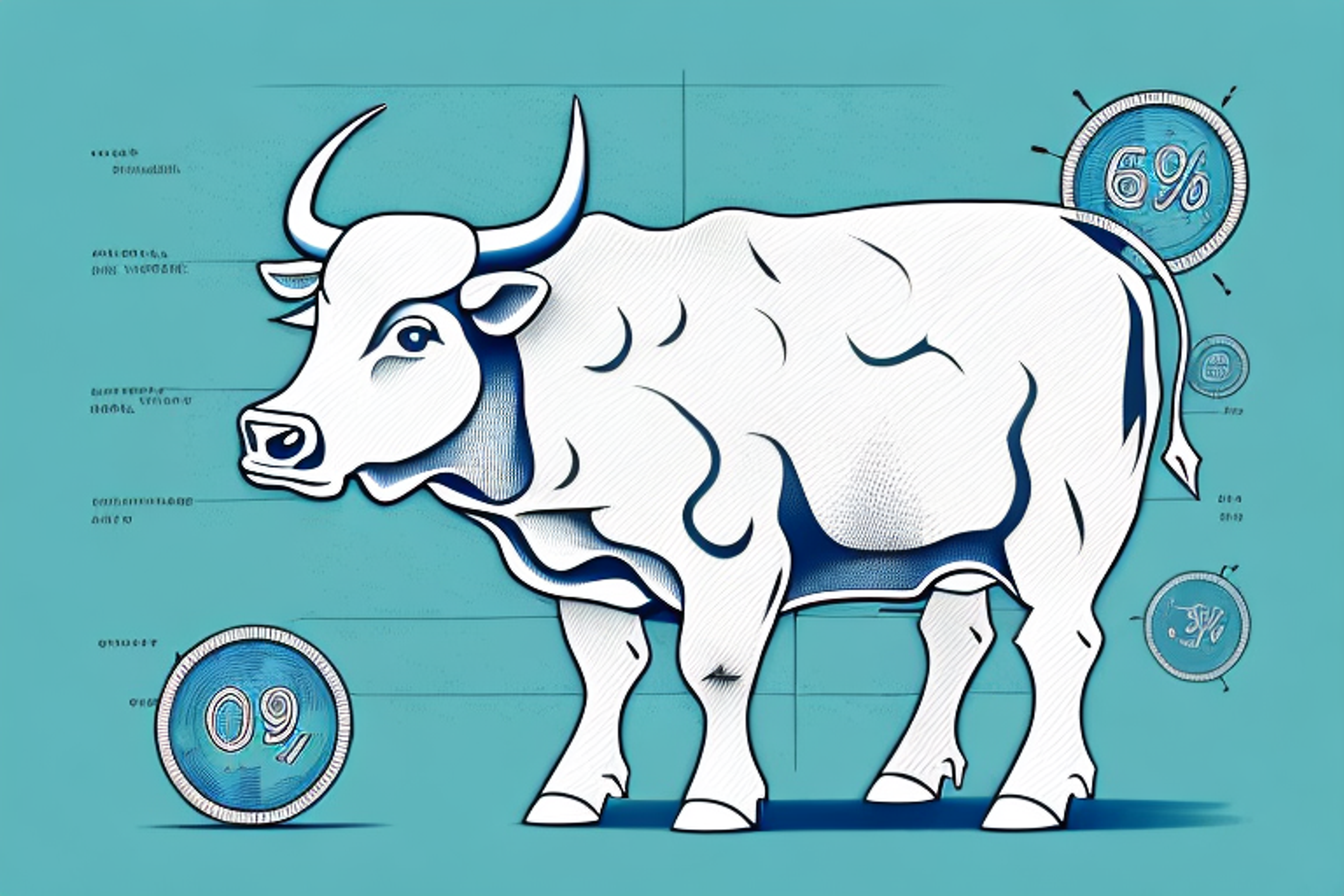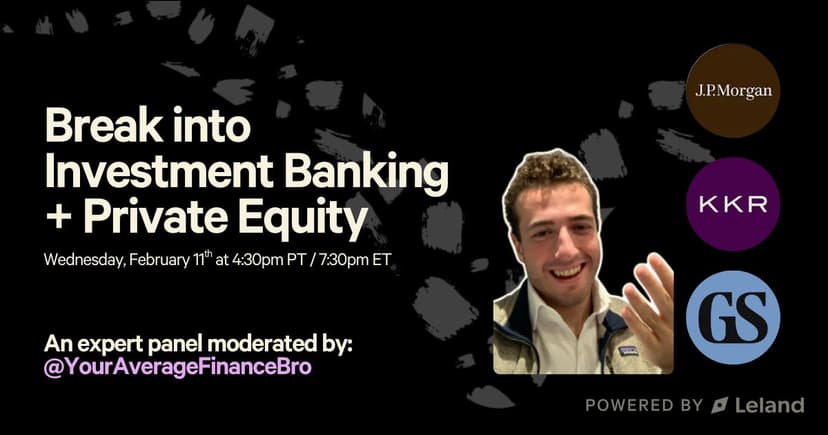Ace Your Investment Banking Interview: Insider Advice & Strategies
Looking to ace your investment banking interview? Our insider advice and strategies will help you stand out from the competition.
Posted June 13, 2025

Join a free event
Learn from top coaches and industry experts in live, interactive sessions you can join for free.
Table of Contents
If you're preparing for an investment banking interview, you likely know how competitive the field is. Landing a job in this industry requires more than just a strong resume and cover letter. You need to be prepared to showcase your knowledge, skills, and personality during the interview process. In this article, we'll provide you with insider advice and strategies to help you ace your investment banking interview.
Understanding the Investment Banking Industry: The Basics
Before you walk into your interview, it's crucial to have a solid understanding of the investment banking industry. This field is incredibly diverse and complex, so it's essential to do your research and understand the key players, investment vehicles, and financial terms commonly used in the industry. You should be comfortable discussing the various services offered by investment banks, such as underwriting, mergers and acquisitions, and advisory services.
It's also important to be aware of the current trends and challenges facing the investment banking industry. One major trend is the increasing use of technology and automation in financial services, which is changing the way investment banks operate and compete. Another challenge is the regulatory environment, which has become more stringent in the wake of the 2008 financial crisis. As an aspiring investment banker, it's important to stay up-to-date on these trends and challenges, and be prepared to discuss how they may impact the industry and your potential employer.
Preparing for Your Investment Banking Interview: Key Steps to Take
Preparation is key to success in any interview, and the same holds for investment banking interviews. Start by reviewing the job description and researching the firm you're interviewing with. Practice answering common interview questions and technical questions. You can find resources online to help you prepare, including mock interview guides and sample questions. It's also essential to rehearse your elevator pitch and prepare to discuss your personal and professional experiences in a concise yet compelling way.
Another important step in preparing for your investment banking interview is to network with professionals in the industry. Reach out to alumni from your school or people in your network who work in investment banking. Ask them about their experiences and any advice they have for someone preparing for an interview. This can give you valuable insights into the industry and the firm you're interviewing with.
Finally, make sure to dress appropriately for the interview and arrive early. Dressing professionally shows that you take the interview seriously and are committed to the job. Arriving early gives you time to compose yourself and review any last-minute notes or information about the firm. Remember, the interview is your chance to showcase your skills and experience, so be confident and stay focused.
Crafting Your Personal Brand: How to Stand Out from Other Candidates
In such a competitive industry, it's crucial to differentiate yourself from other candidates. You can do so by crafting a compelling personal brand. Start by identifying your unique skills, experiences, and values. Then, showcase them during the interview in a way that sets you apart from others. Consider how you can demonstrate your passion for the industry, your intellectual curiosity, and your ability to work well under pressure.
Another way to stand out from other candidates is by creating a strong online presence. This includes having a professional website or LinkedIn profile that highlights your achievements and showcases your work. You can also use social media platforms to engage with industry leaders and share your insights on relevant topics.
It's important to remember that your personal brand is not just about what you say, but also how you present yourself. Dress professionally, maintain good posture, and make eye contact during interviews. These nonverbal cues can communicate confidence and competence to potential employers.
Common Investment Banking Interview Questions and How to Answer Them
Investment banking interviews often include a mix of technical questions and behavioral questions. Common technical questions include those related to financial modeling, accounting, and valuation concepts. Behavioral questions aim to evaluate how well you'll fit in with the team and how you've handled previous challenges. Prepare for both types of questions by practicing with sample questions and thinking through your answers in advance.
It's important to note that investment banking interviews can also include case study questions, which require you to analyze a hypothetical business scenario and provide recommendations. These questions test your ability to think critically and apply your knowledge to real-world situations. To prepare for case study questions, practice analyzing case studies and presenting your findings in a clear and concise manner.
In addition to technical and behavioral questions, interviewers may also ask about your knowledge of the industry and current events. Stay up-to-date on the latest news and trends in investment banking by reading industry publications and attending networking events. This will demonstrate your interest and commitment to the field, and help you stand out from other candidates.
Mastering Technical Questions: Tips and Tricks to Excel
If you're nervous about technical questions, consider reviewing the concepts with a study partner or tutor. Practice building financial models, valuing companies, and analyzing financial statements. Consider enrolling in an online course or participating in a free webinar to brush up on your technical skills.
Another helpful tip is to stay up-to-date with industry news and trends. This will not only help you understand the technical concepts better, but it will also show your interviewer that you are knowledgeable and passionate about the field. You can subscribe to industry newsletters, attend conferences, or follow relevant social media accounts.
Lastly, don't be afraid to ask questions during the interview. If you're unsure about a technical term or concept, ask for clarification. This shows that you are engaged and willing to learn. It's better to ask questions and show your interest than to pretend you know everything and risk making a mistake.
Navigating Behavioral Questions: What Employers Are Looking For
Behavioral questions aim to get a sense of how you'd handle various scenarios and challenges. Employers are looking for candidates who demonstrate strong communication skills, leadership potential, and a commitment to teamwork. Prepare for behavioral questions by reflecting on previous experiences, thinking through how you handled challenges, and considering what you learned from those experiences.
It's important to remember that behavioral questions are often open-ended and require more than a simple yes or no answer. Employers want to see how you think and problem-solve in real-life situations. Be sure to provide specific examples and use the STAR method (Situation, Task, Action, Result) to structure your responses. Additionally, don't be afraid to ask clarifying questions or take a moment to gather your thoughts before answering. This shows that you are thoughtful and deliberate in your approach to problem-solving.
How to Prepare for a Case Study Interview: Insights and Best Practices
Many investment banking interviews include a case study component. During a case study, you'll be asked to analyze a business problem or scenario and provide a solution. To prepare for this type of interview, practice with sample case studies or consider hiring a tutor to help you develop your problem-solving and critical thinking skills. Don't forget to showcase your reasoning process and be prepared to explain your solutions thoroughly.
It's also important to research the company you're interviewing with and understand their industry and competitors. This will help you tailor your solutions to their specific needs and demonstrate your knowledge and interest in the company. Additionally, practice your communication skills and be prepared to work collaboratively with the interviewer or other candidates if the case study involves group work. Remember to stay calm and focused, and don't be afraid to ask clarifying questions if needed.
Top Mistakes to Avoid During Your Investment Banking Interview
Avoid common mistakes during your interview, such as arriving late, being unprepared, or not engaging with the interviewer. Remember to listen carefully to the interviewer's questions, respond thoughtfully, and actively engage with the interviewer throughout the process. Be sure to dress professionally, research the company in advance, and arrive with a positive attitude and a willingness to learn.
Another important mistake to avoid during your investment banking interview is talking too much about yourself and not enough about the company and the role you are applying for. While it's important to showcase your skills and experience, it's equally important to demonstrate your knowledge and interest in the company and the industry. Make sure to research the company's recent deals and news, and come prepared with thoughtful questions about the role and the company's future plans. This will show the interviewer that you are not only a qualified candidate, but also a good fit for the company culture and values.
Dressing for Success: What to Wear to Your Investment Banking Interview
Dress professionally for your interview. For men, this typically means wearing a suit and tie, while women may consider wearing a pantsuit or skirt suit. Avoid loud colors or patterns and opt for something conservative and classic. Be sure to look well-groomed and polished, and take the time to check your appearance before the interview.
It's important to note that the dress code for investment banking interviews may vary depending on the company and location. Research the company culture and dress code beforehand to ensure you are dressed appropriately. Additionally, consider the weather and location of the interview. If it's a hot summer day, you may want to opt for lighter fabrics and colors to stay cool and comfortable.
Remember that your appearance is just one aspect of your overall presentation during the interview. Be sure to also prepare for the interview questions and practice your communication skills. Good luck!
Following Up After the Interview: Simple Strategies That Make a Difference
After your interview, send a thank-you note or email. Thank the interviewer for their time and express your continued interest in the position. Use this as an opportunity to summarize your strengths and reiterate why you're a strong fit for the job. You can also use this as an opportunity to ask any follow-up questions or clarify any miscommunications.
Dealing with Rejection: How to Stay Positive and Learn from the Experience
If you don't receive an offer after your investment banking interview, don't get discouraged. Take the opportunity to reflect on the experience and learn from your mistakes. Consider asking the interviewer for feedback on how you can improve in the future. And don't forget that there are other opportunities out there. Take the lessons you learned from this experience and apply them to your next interview.
In conclusion, acing your investment banking interview requires preparation, dedication, and a willingness to learn. By following the advice and strategies outlined in this article, you'll be well on your way to landing your dream job in the industry.
Browse hundreds of expert coaches
Leland coaches have helped thousands of people achieve their goals. A dedicated mentor can make all the difference.




















